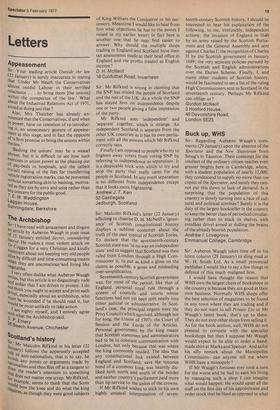Sir: Malcolm Rifkind's letter (22 January) affecting to chastise D.
H. McNeill's 'ignorance' of' Scottish constitutional history displays a sublime contempt about the truth of the past typical of Scottish Tories. To declare that the seventeenth-century Scottish state was 'in no way an independent state' and to suggest that Scotland was then ruled from London through a High Commissioner is, to put as kind a gloss on the claims as possible, a gross and misleading over-simplification.
Seventeenth-century Scottish government was, for most of the period, like that of England, personal royal rule through a system of -councils and courts whose functions had not yet been split neatly into either judicial or administrative. In Scotland's case, the principal organs were the Privy Council (which survived, although not for long, the Union of 1707), the Court of Session and the Lords of the Articles. Personal government by the king meant that Scottish statesmen and administrators had to be in constant communication with London, but only because that was where the king commonly resided. The idea that any constitutional link existed between England and Scotland, save the tenuous bond of a common king, was heartily disliked both north and south of the border and neither country's parliament paid more than lip-service to the union of the crowns.
If Mr Rif kind wishes to stick to his own highly unusual interpretation of seven teenth-century Scottish history, I should be interested to hear his explanation of the following, to me, irrefutably, independent
actions: the invasion of England in 1640 by an army raised by the Scottish Parlia ment and the General Assembly and sent against Charles I; the recognition of Charles II by the Scottish government in January 1649; the very separate policies pursued by the Scottish and English administrations over the Darien Scheme. Finally, I. and many other students of Scottish history, would be fascinated to see a list of the ruling High Commissioners sent to Scotland in the seventeenth century. Perhaps Mr Rifkind can oblige us?
Gordon McNeill 3 Hosford House, 48 Devonshire Road, London SE23


































 Previous page
Previous page